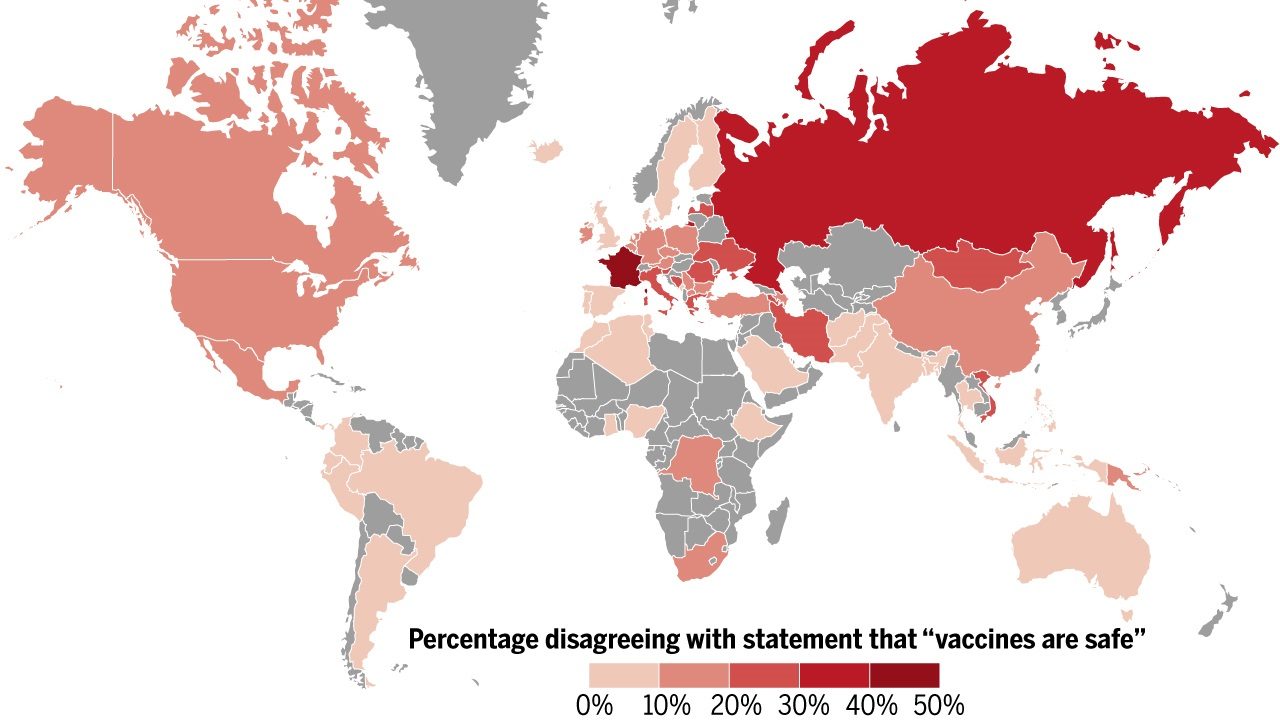The French had less confidence in the safety of vaccines than the residents of 66 other countries recently surveyed by researchers.
A team lead by anthropologist Heidi Larson of the London School of Hygiene & Tropical Medicine conducted what it contends is “the largest survey on confidence in immunization to date,” interviewing more than 65,000 people. As the researchers report online in EBioMedicine today, 41% of respondents in France disagreed with the assertion that vaccines are safe. On average, just 12% of respondents in other nations disagreed with this statement.
“I didn’t expect France to be as negative as it was,” says Larson, who runs The Vaccine Confidence Project, a nonprofit that monitors public concerns about immunization. At the other end of the scale, only 0.2% of the respondents in Bangladesh had similar safety misgivings.
Larson notes that France recently has experienced “anxiety” about suspected but unproven links between the hepatitis B vaccine and multiple sclerosis and, separately, the human papillomavirus vaccine and side effects like fatigue in girls. France similarly had strong reservations about a flu vaccine quickly made to combat the pandemic of H1N1 in 2009. “There was a furor that the government bought so much of that vaccine and a worry that it was made too quickly and couldn’t be safe,” Larson says.
The survey, conducted between September and December 2015, also asked respondents whether they thought vaccines were effective, important for children, and in keeping with their religious beliefs.
Russians had the greatest skepticism about the importance of vaccines for children: 17.1%. Bosnia and Herzegovina had the most serious doubts about the effectiveness of vaccines, with a whopping 27.3% of respondents expressing a “negative sentiment.” Both numbers were about three times higher than the global average.
Religious beliefs were trickier. In Mongolia, where about half the population is Buddhist, with the rest aligned with other faiths, 50.5% of respondents said vaccines were not compatible with their religion; that was about three times higher than the global average. But Larson said a deeper analysis found that where a person lived had more influence on their attitudes about vaccines than their particular faith. “That particularly struck me,” Larson says. “It wasn’t about any particular religious dogma, but it was very much embedded in politics and localness.”
In the United States, 8.8% questioned the importance of vaccines for children, 13.5% were not convinced they were safe, 9.6% had doubts about effectiveness, and 10.5% had concerns because of their religious beliefs.
Larson says some unfounded safety concerns about vaccines persist because people are searching for clear causes to maladies like multiple sclerosis and autism that current science cannot fully explain. “People are also fed up with the didactic that says: You should just get vaccinated because it’s good for you,” Larson says. One concrete step public health officials could take is to invest more in educating health care workers about the risks and benefits of vaccines, she says. “We need to get our heads around the fact that we’re never going to get 100% compliancy,” Larson says. “We’re struggling to keep it where it is.”
